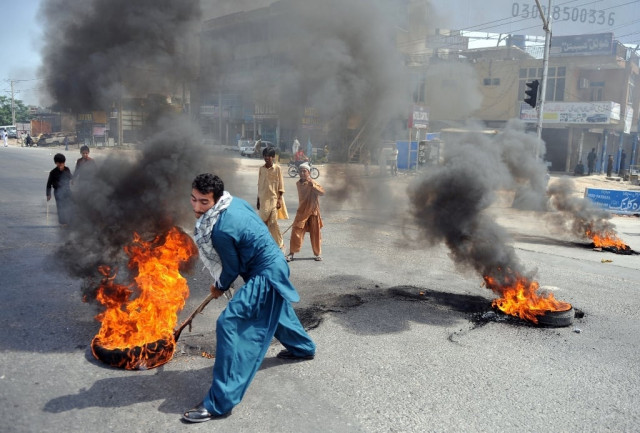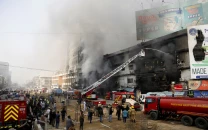Hardliners dictated Pakistan protests agenda: Analysts
Najam Sethi, editor-in-chief of the Daily Times, said the day of protest was a calculated move that backfired.

As anger raged across the Muslim world at the US-made "Innocence of Muslims", the coalition government led by the Pakistan People's Party (PPP) declared Friday a public holiday and encouraged people to protest peacefully.
But what was officially a "day of love for the prophet" ended in bloodshed and looting, with 21 people killed and more than 200 injured as angry demonstrators clashed with police, smashing up shops, cinemas and fast food outlets in major cities.
Compounding the problems for Pakistan's leaders, on Saturday Railways Minister Ghulam Ahmed Bilour offered $100,000 of his own money to anyone who killed the film-maker, urging the Taliban and al Qaeda to join the hunt to accomplish what he called the "noble deed".
More than 50 people have died around the world in violence linked to the low-budget movie, which mocks Islam and Prophet Muhammad (pbuh), since the first demonstrations erupted on September 11.
But if the Pakistan government's intention in calling a public holiday was to take the sting out of the demonstrations on its own doorstep, the policy failed. There had been dozens of rallies against the film, some of which had led to clashes, but nothing on the scale of Friday's violence.
While the number of protesters was relatively small -- around 45,000 out of a population of 180 million -- many carried the banners of extremist groups, and as often happens in Pakistan, their voices drowned out the forces of moderation.
Najam Sethi, editor-in-chief of a Pakistan-based English-language newspaper, said the day of protest was a calculated move that backfired.
"It was a gamble. They hoped and thought that the demonstrations would be peaceful," he told AFP.
"And even when they saw this could turn violent, they did not do anything, or much, because they're afraid, as they are already accused of being soft on the West."
Author and analyst Hasan Askari said the events showed the elected government had allowed a small but vocal minority from the religious right to dictate the agenda.
"As usual the government played on the wicket of religious elements and lost to them," he told AFP.
"By declaring Friday as a holiday it did not keep the initiative with it. The initiative went in the hands of the religious elements."
The Pakistani government on Sunday distanced itself from Bilour's bounty offer but political analyst Rasul Bakhsh Rais said it was further evidence of politicians' willingness to try to capitalize on religious sentiment.
"The statement shows the so-called secular and moderate politicians are using the name of Islam for domestic politics," Rais said of the reward offer.
Bilour's Awami National Party (ANP) is under pressure from religious groups in the deeply conservative northwestern province of Khyber Pakhtunkhwa, where it holds power and where anti-Western feeling runs deep.
The bounty was in part an attempt to outflank the religious right, Askari said -- to show that the nominally secular ANP can be as strong as anyone.
But efforts by mainstream parties to win support from religious conservatives -- to ride the tiger of extremism -- are both unlikely to succeed and fraught with risk, warned Rais.
"It is typical of the mindset of the leaders to play to the gallery," he said.
"It will encourage religious fanaticism and in the long term it may harm peace and stability at home. Such elements need to be condemned."
Askari said that while Bilour's offer of a bounty was embarrassing to the government internationally, particularly with President Asif Ali Zardari due to address the UN General Assembly on Tuesday, it was also indicative of a stratum of opinion within the coalition.
"These things show that hard line thinking is there in the government circles also," he told AFP.
"There is a common phenomenon of point-scoring in Pakistan politics and Bilour wanted to show that 'we are not lagging behind any other group'."
A general election is due in the next few months and with anti-US sentiment running higher than ever in Pakistan, the government thought it could seize the moment to boost its popularity, said Sethi.
"Everything, including this attitude, is also linked to the upcoming elections".



















COMMENTS
Comments are moderated and generally will be posted if they are on-topic and not abusive.
For more information, please see our Comments FAQ